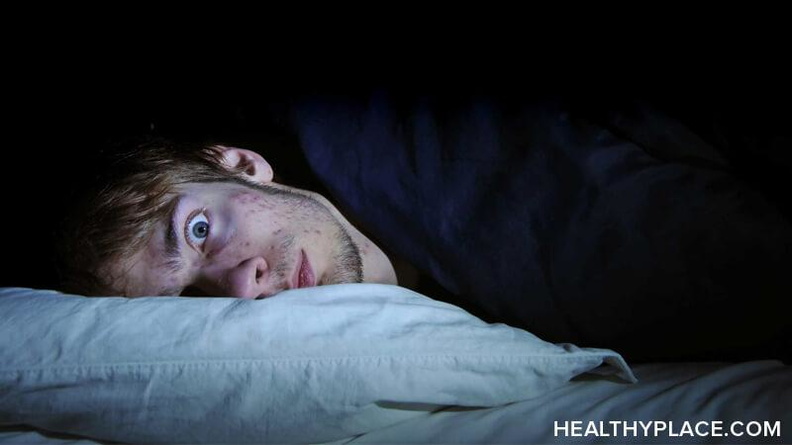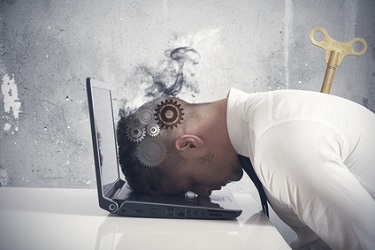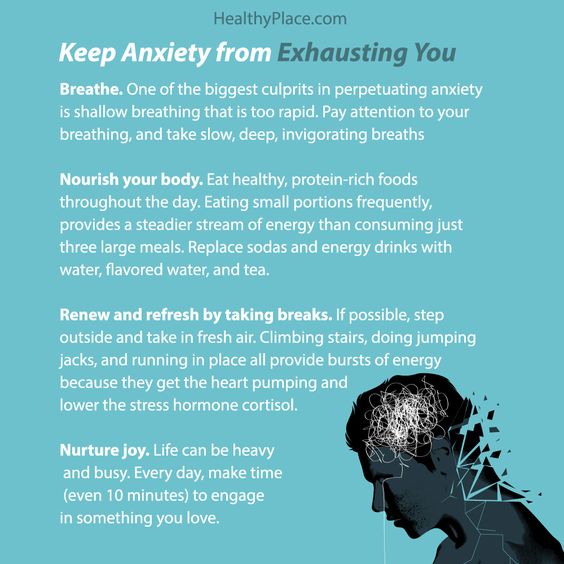Anxiety and Exhaustion: Wired and Tired

Anxiety and exhaustion frequently go hand in hand. Feeling anxious day after day is exhausting, and when we’re so worn out, anxiety worsens because managing it becomes more difficult. The fatigue of anxiety often feels different than the exhaustion of depression. Whereas depression can zap people of energy and motivation and make it difficult to be up and about, anxiety can put people on almost constant alert, leading to a sensation often described as tired and wired. Increasing awareness of anxiety and exhaustion can help you take measures to feel better physically, mentally, and emotionally.
Anxiety has multiple symptoms and the effects of anxiety are many. Symptoms are signs in the body and brain that we’re experiencing anxiety and effects are ways in which anxiety interferes in our lives; symptoms and effects can overlap (Anxiety Symptoms: Recognizing Signs of Anxiety). A few symptoms and effects include:
- Headaches
- Digestive problems
- Breathing difficulties, including breathing that is too shallow
- Muscle tension
- Difficulty concentrating
- Racing thoughts (worries, fears, and what-ifs)
- Restlessness
- Difficulty sleeping
- Irritability
Together, these manifestations of anxiety swirl into the perfect storm to create what can be crushing exhaustion.
Why Does Anxiety Cause Exhaustion?
 Anxiety and exhaustion commonly occur together because of the very nature of anxiety. More than a simple label, anxiety is a force that invades our entire being. We experience anxiety on many levels and doing so can make us feel keyed up and eventually worn out. Being worn out, though, doesn’t diminish anxiety. Our mind is spent, our body is fatigued, and our anxiety is keyed up in full force. As a result, we are truly tired and wired.
Anxiety and exhaustion commonly occur together because of the very nature of anxiety. More than a simple label, anxiety is a force that invades our entire being. We experience anxiety on many levels and doing so can make us feel keyed up and eventually worn out. Being worn out, though, doesn’t diminish anxiety. Our mind is spent, our body is fatigued, and our anxiety is keyed up in full force. As a result, we are truly tired and wired.
Living with worries and fears, whether real threats or dangers perceived by our thoughts and emotions, affects our whole being. With so much of our energy consumed by anxiety, we can be depleted of the energy needed to function in our lives.
Keep Anxiety from Exhausting You
The obvious approach to taking care of yourself to diminish fatigue is to increase the amount and quality of your sleep (The [Dysfunctional] Relationship Between Sleep and Anxiety). Often, this isn’t enough to counter the sweeping tired-yet-wired experience caused by anxiety. Enough quality sleep is an important component of a plan to reclaim your vigor, but to truly enhance your sense of vitality, other steps are needed, too.
- Think in terms of reclaiming your energy in moments throughout the day. At first, it might be hard to feel lasting oomph, but it is possible to create energy for meaningful moments.
- Breathe. One of the biggest culprits in perpetuating anxiety is shallow breathing that is too rapid. Pay attention to your breathing, and take slow, deep, invigorating breaths (Diaphragmatic Breathing for Anxiety Sufferers).
- Nourish your body. Eat healthy, protein-rich foods throughout the day; grazing, or eating small portions frequently, provides a steadier stream of energy than consuming just three large meals. Replace sodas and energy drinks with water, flavored water, and tea.
- Renew and refresh by taking breaks. If possible, step outside and take in fresh air. Move. Climbing stairs, doing jumping jacks, and running in place all provide bursts of energy because they get the heart pumping and lower the stress hormone cortisol.
- Nurture joy. Life can be heavy and busy. Every day, make time (even 10 minutes) to engage in something you love.
It would be great if there were a quick-fix to end anxiety-induced exhaustion. While there isn’t a quick-fix that works and lasts, there is something better. By using the above suggestions plus other strategies that you develop, you are replacing anxiety with vitality. You don’t have to be forever tired and wired; you can diminish both anxiety and exhaustion.

Let's connect. I blog here. Find me on Facebook, Twitter, LinkedIn, Instagram, and Pinterest. My self-help book and four mental health novels, including one about severe anxiety disorders, are here.
APA Reference
Peterson, T.
(2017, March 2). Anxiety and Exhaustion: Wired and Tired, HealthyPlace. Retrieved
on 2025, December 21 from https://www.healthyplace.com/blogs/anxiety-schmanxiety/2017/03/anxiety-and-exhaustion-tired-and-wired
Author: Tanya J. Peterson, MS, NCC, DAIS
Can anxiety make you look at people wired and make you feel out of place ? Or dizzy ?
These threads have been helpful in reading to what I have gone through for two weeksO(( Wired and tired, and yet cant pinpoint why. Have depression/anxiety, I sometimes wonder if I am b-polar. I never want isolate etc. I have lots of energy daily, but lately no pizazz. Wellbutrin, I really don't think its working. I wonder if Buspar would be better? Thanks for the threads, I need to rest>
Tanya: Thanks for this article. I've felt wired & tired many times in my life. My husband is in surgery today. Extra stress today & the days leading up to it. Had to get up at 430 am to get him checked in. Felt wire & tired, like i needed some caffeine and an anti-anxiety pill at the same time. Noticed i was still pushing. Stopped, sat down & got a good breakfast. Much better!
Hi Linda,
I hope your husband's surgery went well. I'm really glad that you found this article helpful. I know "wired and tired" up close and personally. It's a state that none of us should stay in -- and it sounds like you took charge of it despite the extra stress yesterday! I wish both you and your husband very well.
Thank you so much for this article, Tanya. It's really helpful. The symptoms describe me perfectly.
I found this article very interesting since it describes my feelings accurately.
Would these symptoms resemble bi-polar
Disorder?
I stRuggle w/clinical depression, but have
Lately been experiencing uncomfortable feelings of being "wired ".
Hi LIz,
When we start to experience new symptoms, it can be really unsettling and sometimes downright frightening. (I've been there.) Being "tired and wired" can be part of several disorders, including bipolar disorder. As with any symptoms, by itself it doesn't indicate anything other than being tired and wired. Bipolar disorder (and others) requires the presence of specific symptoms and a negative impact on someone's life. HealthyPlace has online tests which can help you sort out your symptoms and see if you might meet the criteria for a given disorder. These tests can't diagnose, but they are good tools for understanding yourself and for discussion with your doctor or therapist. Also, HealthyPlace has articles about bipolar disorder. Here are the links:
Online Bipolar Test: https://www.healthyplace.com/psychological-tests/goldberg-screening-for-bipolar-spectrum-…
Bipolar Mania Test: https://www.healthyplace.com/psychological-tests/bipolar-mania-test
Mood Disorder Questionnaire (MDQ): https://www.healthyplace.com/psychological-tests/mood-disorder-questionnaire-mdq
This link takes you to the homepage of the bipolar information. There are many articles that you can click on to read. It might seem overwhelming because you are just wondering if bipolar disorder is a possibility. Simply scan the articles and read only the ones that apply right now. That will be most helpful.